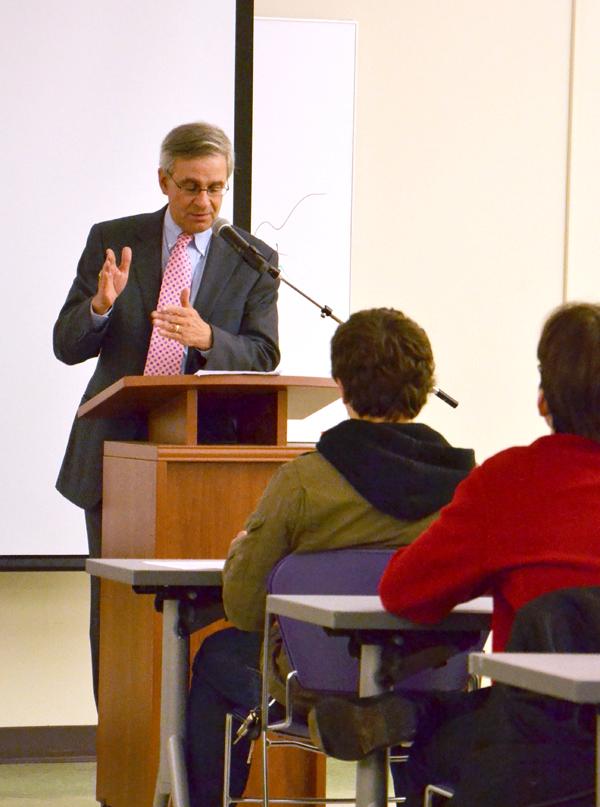
More than 50 Binghamton University community members gathered at 5 p.m. yesterday in New University Union room 120 to hear Pulitzer-Prize-winning journalist David Shribman give a talk about the current political climate, 2012 elections and the future of journalism.
BU President C. Peter Magrath introduced Shribman and described his long list of journalistic accomplishments.
For more than 35 years, Shribman has covered political news. He won a Pulitzer Prize in 1995 for his Washington, D.C. beat reporting and is now executive editor of the Pittsburgh Post-Gazette.
Shribman took questions from the audience and spoke informally, after straying from his prepared 15-page speech.
Students asked questions about GOP candidates in the 2012 presidential election, careers in journalism and new media’s influence on print journalism.
In his brief speech, Shribman said Mitt Romney, former Massachusetts governor and GOP presidential candidate, is in a “very strong position” for his party’s nomination. He said he thought Romney’s chances increased after a gaffe Texas Gov. Rick Perry made during a debate Wednesday when Perry could not name the third federal department he plans to do away with if elected.
“Sometimes you say ‘it’s not what you say, it’s what you don’t say that matters,’ and that was definitely Perry’s problem last night,” Shribman said.
Shribman said the election’s focus is on President Barack Obama.
“This election, like most elections after presidents serve a term, is about Barack Obama, not Mitt Romney,” he said.
In general, Shribman said he believes 2012’s elections will be groundbreaking.
“What’s at stake this time is the whole different view of the way government should be and the way society should be structured,” he said. “We have ideological parties for the first time in our history.”
Shribman said he is a political independent, and he finds both major parties “unreasonable.”
“I think they should compromise, but neither side wants to,” Shribman said.
JOURNALISM
Shribman called new media’s effect on print journalism positive.
“We are the beneficiaries of better writers because we can make changes,” Shribman said. “When I started in journalism, you wrote stories on a typewriter and had to restart every time you made a mistake.”
Shribman did admit that print journalism has made various sacrifices because of new technology.
“We have given up the huge circulation and economic power we used to have,” he said. “We’re making a little less money, but we’ll survive.”
He added that the 24-hour news cycle does make a journalist’s work more difficult.
“We don’t ever stop working,” Shribman said. “But if you love what you do, that’s not so bad.”
Shribman said that reading is the most important thing a writer can do.
“Read everything you can read,” he said.
Arsen Zargarov, a sophomore majoring in political science who attended the event, said he liked Shribman’s approach.
“I thought it was really nice that he didn’t read straight off his speech he had prepared, and that he thought it would be better to have a question-and-answer-based discussion,” Zargarov said. “He added a comedic twist to a lot of what he replied with.”
Julisa Chrysafi, an undeclared freshman, said she also enjoyed the talk.
“I thought he was very informative and answered everyone’s questions with a great amount of insight and depth,” Chrysafi said. “He was humorous and seemed down to earth when he spoke. Overall it was nice to be able to witness.”


